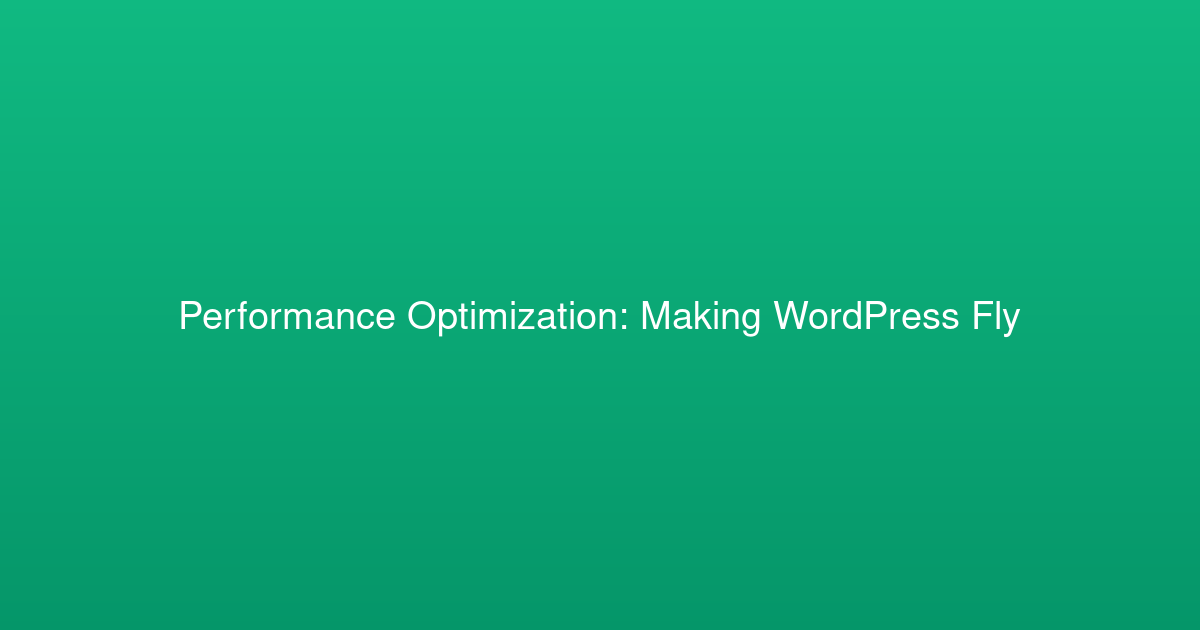Performance Optimization: Making WordPress Fly
From 8-second load times to under 1 second. Real optimization techniques that actually work.

Performance Optimization: Making WordPress Fly
Published: October 8, 2025
A client called me in panic last month. Their WordPress site had been featured on TechCrunch, traffic spiked 10x overnight, and their server was melting down. The homepage was taking 30 seconds to load, if it loaded at all. “Can you make it fast?” they asked. “Like, today?”
Six hours later, their site was loading in under 2 seconds and handling the traffic spike without breaking a sweat. The secret wasn’t magic—it was systematic performance optimization focusing on the bottlenecks that actually matter. Here’s exactly how to make WordPress sites genuinely fast.
The Performance Audit: Finding the Real Problems
Before optimizing anything, you need to understand what’s actually slow. Most performance advice focuses on generic optimizations that might not address your specific bottlenecks.
**Start with GTmetrix or WebPageTest:** These tools show you waterfall charts revealing which resources are taking the most time. Don’t guess—measure.
**Check the server response time:** If Time to First Byte (TTFB) is over 800ms, you have a server problem, not a front-end problem. No amount of image optimization will fix slow database queries.
**Identify the heaviest resources:** Usually it’s images, followed by JavaScript files, then CSS. But sometimes it’s a runaway plugin making dozens of external API calls.
**Monitor real user metrics:** Google PageSpeed Insights shows lab data, but Core Web Vitals show how real users experience your site. Different metrics, different optimizations.
Database Optimization: The Foundation
WordPress performance starts with the database. A slow database makes everything else slow:
**Clean up post revisions:** WordPress saves every draft. Use WP-CLI: `wp post delete $(wp post list –post_type=revision –format=ids)` to remove old revisions.
**Remove spam and trash:** `wp comment delete $(wp comment list –status=spam –format=ids)` cleans up comment spam that clutters the database.
**Optimize database tables:** `wp db optimize` runs MySQL’s OPTIMIZE TABLE on all WordPress tables, reducing fragmentation.
**Add missing indexes:** The Query Monitor plugin shows slow queries. Often, adding database indexes can turn 2-second queries into 20ms queries.
**Use object caching:** Redis or Memcached dramatically reduce database queries for repeated requests. WP Engine and many managed hosts include this automatically.
Hosting: The Platform Matters
You can’t optimize your way out of bad hosting. I’ve seen sites move from GoDaddy shared hosting to WP Engine and immediately get 5x faster with no other changes.
**Managed WordPress hosting wins:** WP Engine, Kinsta, and Flywheel provide optimized server configurations, automatic caching, and CDNs out of the box.
**PHP version matters enormously:** PHP 8.3 is dramatically faster than PHP 7.4. Upgrading PHP often provides bigger performance gains than any plugin.
**Server location affects TTFB:** If your audience is in New York but your server is in Australia, physics creates unavoidable latency.
**Resource limits:** Shared hosting with 64MB memory limits will crash under load. Check your hosting plan’s actual specifications.
Caching: The Easy Performance Win
Caching is the lowest-hanging fruit for WordPress performance:
**Page caching:** WP Rocket, W3 Total Cache, or WP Fastest Cache serve static HTML instead of processing PHP for every request.
**Database query caching:** Object caching stores database query results in memory, eliminating repeated queries.
**Opcode caching:** OPcache stores compiled PHP code in memory, skipping the compilation step for subsequent requests.
**CDN caching:** Cloudflare, MaxCDN, or StackPath serve static assets from geographically distributed servers.
**Browser caching:** Proper cache headers tell browsers to store resources locally, reducing repeat visits’ load times.
Image Optimization: The Biggest Impact
Images usually account for 60-80% of page weight. Optimize them properly, and performance improvements are dramatic:
**Use next-gen formats:** WebP images are 25-35% smaller than JPEG with identical quality. WordPress 5.8+ supports WebP uploads natively.
**Implement responsive images:** WordPress srcset attributes serve appropriately sized images for different screen sizes automatically.
**Add lazy loading:** Native lazy loading (`loading=”lazy”`) or plugins like a3 Lazy Load defer off-screen images until needed.
**Compress existing images:** Smush, ShortPixel, or ImageOptim can reduce image file sizes by 50-80% without visible quality loss.
**Optimize upload workflow:** Configure WordPress to automatically compress new uploads. Prevent huge images from being uploaded in the first place.
Plugin Optimization: Less Is More
Every plugin adds overhead. The goal isn’t zero plugins—it’s strategic plugin usage:
**Audit plugin necessity:** Deactivate plugins one by one and measure performance impact. Some plugins have disproportionate overhead.
**Combine functionality:** One well-coded multipurpose plugin is often faster than several single-purpose plugins.
**Check plugin query counts:** Query Monitor shows which plugins make the most database queries. Heavy offenders might need replacement.
**Remove bloated page builders:** Some page builders add 500KB+ of CSS and JavaScript to every page, even when using simple layouts.
**Disable unnecessary features:** Many plugins load scripts on every page when they’re only needed on specific pages.
JavaScript and CSS Optimization
Front-end optimization requires balancing performance with functionality:
**Minify and combine files:** Tools like Autoptimize or WP Rocket combine multiple CSS/JS files into single, compressed files.
**Load JavaScript conditionally:** Don’t load contact form scripts on pages without contact forms. Use `wp_enqueue_script()` conditionally.
**Defer non-critical JavaScript:** Use `defer` or `async` attributes to prevent JavaScript from blocking page rendering.
**Critical CSS inlining:** Inline above-the-fold CSS to eliminate render-blocking external stylesheets for faster perceived loading.
**Remove unused CSS:** Tools like PurgeCSS remove unused CSS rules, dramatically reducing file sizes in framework-heavy themes.
WordPress-Specific Optimizations
**Disable unnecessary features:**
// In functions.php
remove_action('wp_head', 'wp_generator');
remove_action('wp_head', 'wlwmanifest_link');
remove_action('wp_head', 'rsd_link');
remove_action('wp_head', 'wp_shortlink_wp_head');**Optimize queries:**
// Use WP_Query efficiently
$posts = new WP_Query([
'post_type' => 'product',
'posts_per_page' => 10,
'fields' => 'ids', // Only get IDs if you don't need full post objects
'no_found_rows' => true, // Skip pagination counting
'update_post_meta_cache' => false // Skip meta cache if not needed
]);**Limit post revisions:**
// In wp-config.php
define('WP_POST_REVISIONS', 3);Monitoring and Maintenance
Performance optimization isn’t a one-time task—it requires ongoing monitoring:
**Set up performance monitoring:** UptimeRobot, Pingdom, or GTmetrix can alert you when performance degrades.
**Regular performance audits:** Monthly checks ensure new content or plugins haven’t introduced performance regressions.
**Update everything:** WordPress core, themes, and plugins often include performance improvements. Stay current.
**Monitor Core Web Vitals:** Google Search Console shows real-world performance metrics that affect search rankings.
The 80/20 of WordPress Performance
If you only have time for a few optimizations, focus on these high-impact changes:
- **Upgrade to PHP 8.3+** – Often 50-100% faster than old PHP versions
- **Install a caching plugin** – WP Rocket or similar for instant speed gains
- **Optimize images** – Compress existing images and add lazy loading
- **Choose better hosting** – Managed WordPress hosting vs. shared hosting
- **Enable a CDN** – Cloudflare’s free plan provides global asset delivery
These five changes typically improve loading times by 3-5x with minimal effort.
Real-World Results
Back to that TechCrunch-featured client: we upgraded their PHP version (5 minutes), enabled WP Rocket caching (10 minutes), optimized their images (30 minutes), and moved them to WP Engine hosting (4 hours for DNS propagation).
Total cost: $300 for hosting upgrade + $99 for WP Rocket. Total time: 6 hours. Result: 30-second load times became 1.8-second load times, and the site handled 50x traffic without issues.
WordPress performance isn’t about perfection—it’s about identifying and fixing the biggest bottlenecks first. Measure, optimize, repeat. Your users (and search rankings) will thank you.


